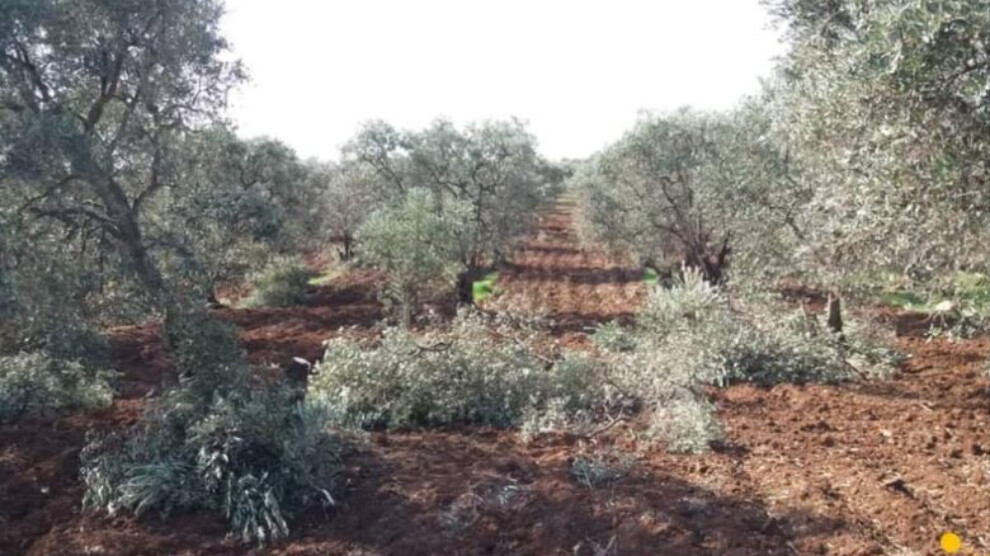Ecocide in Turkish-occupied Afrin continues
Mercenaries of the Turkish occupation continue cutting down and burning trees in the occupied Afrin region, as well as destroying numerous forest trees in intentional fires.
Mercenaries of the Turkish occupation continue cutting down and burning trees in the occupied Afrin region, as well as destroying numerous forest trees in intentional fires.

Citing sources from Afrin, ANHA reports that the Turkish-backed mercenaries cut down dozens of olive, walnut and fig trees in a village in the occupied Afrin canton.
According to the report, the trees belonged to resident Imad Hisen from the village of Xilner near the neighborhood of Zediye.
In May alone, the mercenaries of the Turkish occupation cut down a total of 2,124 olive and pomegranate trees in the occupied Afrin region. Additionally, approximately 18,000 olive trees were burned. Furthermore, intentional fires destroyed numerous forest trees, according to a balance sheet published by the Syrian Democratic Forces (SDF) on June 4.
Afrin Canton was the westernmost canton of Rojava and North and East Syria, home to 200,000 ethnic Kurds. Though the population was overwhelmingly Kurdish, it was home to diverse religious groups including Yazidis, Alawites and Christians alongside Sunni Muslims.
On 20 January 2018, Turkey launched air strikes on 100 locations in Afrin, as the onset of an invasion they dubbed ‘Operation Olive Branch.’
The Turkish Airforce indiscriminately shelled civilians as well as YPG/YPJ positions, while a ground assault was carried out by factions and militias organised under the umbrella of the Turkish-backed National Army.
By 15 March, Turkish-backed militias had encircled Afrin city and placed it under artillery bombardment. A Turkish airstrike struck the city’s only functioning hospital, killing 16 civilians.
Civilians fled and the SDF retreated, and by 18 March Turkey was in de facto occupation of Afrin. Between 400 and 500 civilians died in the invasion, overwhelmingly as a result of Turkish bombing. Other civilians were summarily executed in the field.
Prior to the Turkish invasion, Afrin had been one of the most peaceful and secure parts of Syria, virtually never seeing combat during the civil war bar occasional skirmishes between YPG/YPJ and jihadi forces on its borders. As a result, Afrin offered peaceful sanctuary to over 300,000 internally displaced people from elsewhere in Syria.
According to various sources, the Kurdish share of the population has fallen from over ninety per cent before the occupation to between 15 and 22 per cent.
The Human Rights Organisation of Afrin report for the first half of 2023 states that twelve people were killed in Afrin in the last six months by artillery fire, drone attacks or gunfire from the occupation forces. A particularly gruesome crime occurred in Jindires on 20 March, when four members of a family were killed. The victims, aged between 18 and 43, were shot by the pro-Turkey mercenary force Ahrar al-Sharqiya as they lit a fire in front of their house to celebrate the Kurdish New Year festival of Newroz.
In the same period, there were 173 kidnappings for which ransom was demanded. This inhuman practice has become a funding model for the mercenary groups in Afrin. The abductees are held in torture prisons, many of which are run by the Turkish intelligence service MIT. The latter uses all possible means to extort information from the prisoners. There are repeated reports of people dying under torture.
In addition to the human rights violations, nature and agriculture in Afrin have also been attacked. Mercenary groups and "aid organisations" with links to the Turkish state destroyed large areas of forest and agricultural land to make way for the settlement of pro-Turkish settlers. According to the report, 15,500 trees, including olive, walnut and almond trees, and numerous forest areas were cut down. In addition, more than 70 hectares of wheat and barley fields were burnt down. Various organisations from Palestine, Qatar and Turkey are involved in these settlement programmes.